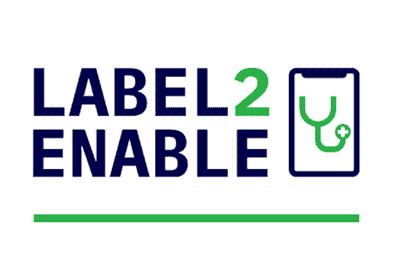Digitalisation is growing at a rapid speed and health is not being left behind. As the technological world advances and we continue to rely more and more on modern technology, how can we empower people through health apps and enhance person-centred care? We talk with international expert in health app assessment, Petra Hoogendoorn, to find out how health apps can contribute to a healthy lifestyle, and offer support and regular health care.
The energy label, but for health apps
Do you know and use the EU energy label? The answer is likely yes. The EU energy label is used in four out of five electronic appliance purchase decisions. I’ve worked on a similar label but for health apps.
There are more than 300,000 health apps available and finding one relevant to your specific needs is difficult and choosing one is even more challenging. The order of apps found in app stores does not indicate quality, nor do user reviews or app descriptions. People with low health literacy are more often in poor health and could thus benefit more from quality apps. Yet users of health apps are generally younger, higher educated and ‘eHealth literate’. However, apps should be universal, they should empower individuals and be inclusive. A health app label can bridge the digital skills gap, by creating quality and purposeful apps to be clearer and easier to understand. It can support individuals who have lower levels of digital literacy to select an app suitable to their wants and needs regarding health issues.
Apps to achieve person-centred healthcare
The European Commission aims to use digital tools and data for person-centred healthcare and citizen empowerment, and I couldn’t agree more. My late husband was diagnosed with a brain tumour in 2009. I tried to help maintain his and our family’s quality of life, simultaneously maintaining my job as a Regional Deputy Director. To cut a long story short, I decided to create two health apps in oncology. My background in industrial engineering and change management lent itself to provide me with the knowledge and skills to initiate this idea. The ReMind app makes a cognitive rehabilitation with a positive effect on memory, attention, and fatigue available for patients. The Goings-On app enables patients to log their symptoms and their functioning in activities that matter most in their everyday lives in a minute a day. For instance, this may include the individuals specific family role, relationships, friendships, occupation, or leisure activities. This personal data helps attain treatments and symptom management that fit both the disease and the person with the disease.
A label to advance uptake apps in healthcare
Research is a necessity for uptake of treatments including apps in healthcare. Yet, I soon found out that even exceptional research results don’t equal uptake. My favourite example is an app in which cancer patients could monitor their symptoms on a weekly basis. A random half of a stunning 766 cancer patients used the app. They lived 5 months longer with more quality of life and less hospitalisations. Those with less computer skills benefitted more. Yet 6 years later, this type of app is still not standard cancer care. Labelling has been proposed to advance.
A label to help suppliers deliver quality apps
The European Commission strives for an innovative, sustainable, and globally competitive health industry and healthcare system and asks for common principles and certification. We made CEN-ISO/TS 82304-2: health and wellness apps – quality and reliability. The main content of this new standard is a health app assessment framework and health app label. Eighty-three experts from 8 stakeholder groups helped make the framework, which includes 67 quality requirements in 4 quality aspects. After testing with people with low health literacy these aspects were phrased ‘Healthy and safe’, ‘Easy to use’, ‘Secure data’, and ‘Robust build’. The label communicates the results of the assessment: the intended use and quality of a particular health app in all 4 quality aspects. The Easy to use score may be of particular interest to people with low health literacy.
What's next?
In June 2022 we started the Horizon Europe Label2Enable project, again an initiative of the European Commission. In the project EuroHealthNet leads the task to test the health app label with people with low health literacy in Denmark, Hungary, Italy, and we hope France. We will find out if the translation of the label is understandable and what works in introducing the label. We will then deliver the communication that works at scale.
The Label2Enable project also delivers the communication that works for healthcare professionals: the health app report. Another deliverable is the trusted certification scheme for the assessment framework that works for health app manufacturers, app assessors and authorities. The scheme will align with EU legislation and EU values. Several authorities are part of our efforts. With them we seek to achieve a single market, that is cross-country recognition of health app assessments with the certification scheme.
Quality health apps can benefit consumers, healthcare professionals and healthcare systems. Adopt and use the health app label to help us all with healthy and safe, easy to use apps with robust builds that secure data.



Petra Hoogendoorn
Petra Hoogendoorn is an international expert in health app assessment. Petra is lead expert of CEN-ISO/DTS 82304-2’s health app assessment framework and health app label. She coordinates the Horizon Europe project Label2Enable.
